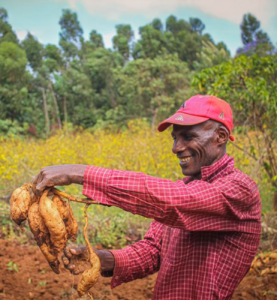 Climate-related shocks have become increasingly frequent in arid and semi-arid regions, disrupting livelihoods and entrenching vulnerability in millions of people living in these regions. For instance, in Kenya’s arid and semi-arid lands (ASALs), over four million people face acute food insecurity and about 650,000 children below the age of five are acutely malnourished. While humanitarian aid has been critical for life sustenance for people living in these regions during crises, this has largely focused on emergency relief measures such as cash and/or food provision. Evidence shows that the impacts of such approaches are short-lived and hardly build resilience to future shocks.
Climate-related shocks have become increasingly frequent in arid and semi-arid regions, disrupting livelihoods and entrenching vulnerability in millions of people living in these regions. For instance, in Kenya’s arid and semi-arid lands (ASALs), over four million people face acute food insecurity and about 650,000 children below the age of five are acutely malnourished. While humanitarian aid has been critical for life sustenance for people living in these regions during crises, this has largely focused on emergency relief measures such as cash and/or food provision. Evidence shows that the impacts of such approaches are short-lived and hardly build resilience to future shocks.
Nutrition-sensitive agriculture (NSA), using resilient technologies, is a viable approach to enhancing sustainability and resilience in humanitarian interventions in ASALs. A recent study by the International Potato Center (CIP) highlights how NSA interventions, specifically the promotion of biofortified orange-fleshed sweetpotato (OFSP) varieties, are helping communities in ASAL counties in Kenya to sustainably improve food and nutritional security. In collaboration with the World Food Programme (WFP) and other development partners, CIP-developed OFSP varieties have been integrated into humanitarian interventions targeting these regions, through the Development and Delivery of Biofortified Crops at Scale (DDBIO) project.
These NSA interventions target both the supply- and demand-side enablers to OFSP uptake; on the supply-side, interventions to enhance accessibility to OFSP include establishment and support of community-level OFSP vine multipliers (decentralized vine multipliers, DVMs), establishment of OFSP gardens at local clinics for vine distribution to pregnant and lactating mothers, and support to county agricultural extension officers for dissemination of sweetpotato good agronomic practices. On the demand-side, interventions to create demand for OFSP include nutrition education to pregnant and lactating mothers, and distribution of healthy baby toolkits (HBT) to enhance good child-feeding practices. This dual approach ensures that communities are not only sensitized on nutrition and benefits of OFSP but also have access to OFSP roots and/or vines for own production. Read More
